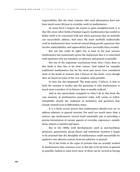unprovability. But the issue remains why such phenomena have not been much more obvious in everyday work in mathematics.
At some level I suspect the reason is quite straightforward: it is that like most other fields of human inquiry mathematics has tended to define itself to be concerned with just those questions that its methods can successfully address. And since the main methods traditionally used in mathematics have revolved around doing proofs, questions that involve undecidability and unprovability have inevitably been avoided.
But can this really be right? For at least in the past century mathematics has consistently given the impression that it is concerned with questions that are somehow as arbitrary and general as possible.
But one of the important conclusions from what I have done in this book is that this is far from correct. And indeed for example traditional mathematics has for the most part never even considered most of the kinds of systems that I discuss in this book—even though they are based on some of the very simplest rules possible.
So how has this happened? The main point, I believe, is that in both the systems it studies and the questions it asks mathematics is much more a product of its history than is usually realized.
And in fact particularly compared to what I do in this book the vast majority of mathematics practiced today still seems to follow remarkably closely the traditions of arithmetic and geometry that already existed even in Babylonian times.
It is a fairly recent notion that mathematics should even try to address arbitrary or general systems. For until not much more than a century ago mathematics viewed itself essentially just as providing a precise formulation of certain aspects of everyday experience—mainly those related to number and space.
But in the 1800s, with developments such as non-Euclidean geometry, quaternions, group theory and transfinite numbers it began to be assumed that the discipline of mathematics could successfully be applied to any abstract system, however arbitrary or general.
Yet if one looks at the types of systems that are actually studied in mathematics they continue even to this day to be far from as general as possible. Indeed at some level most of them can be viewed as having




